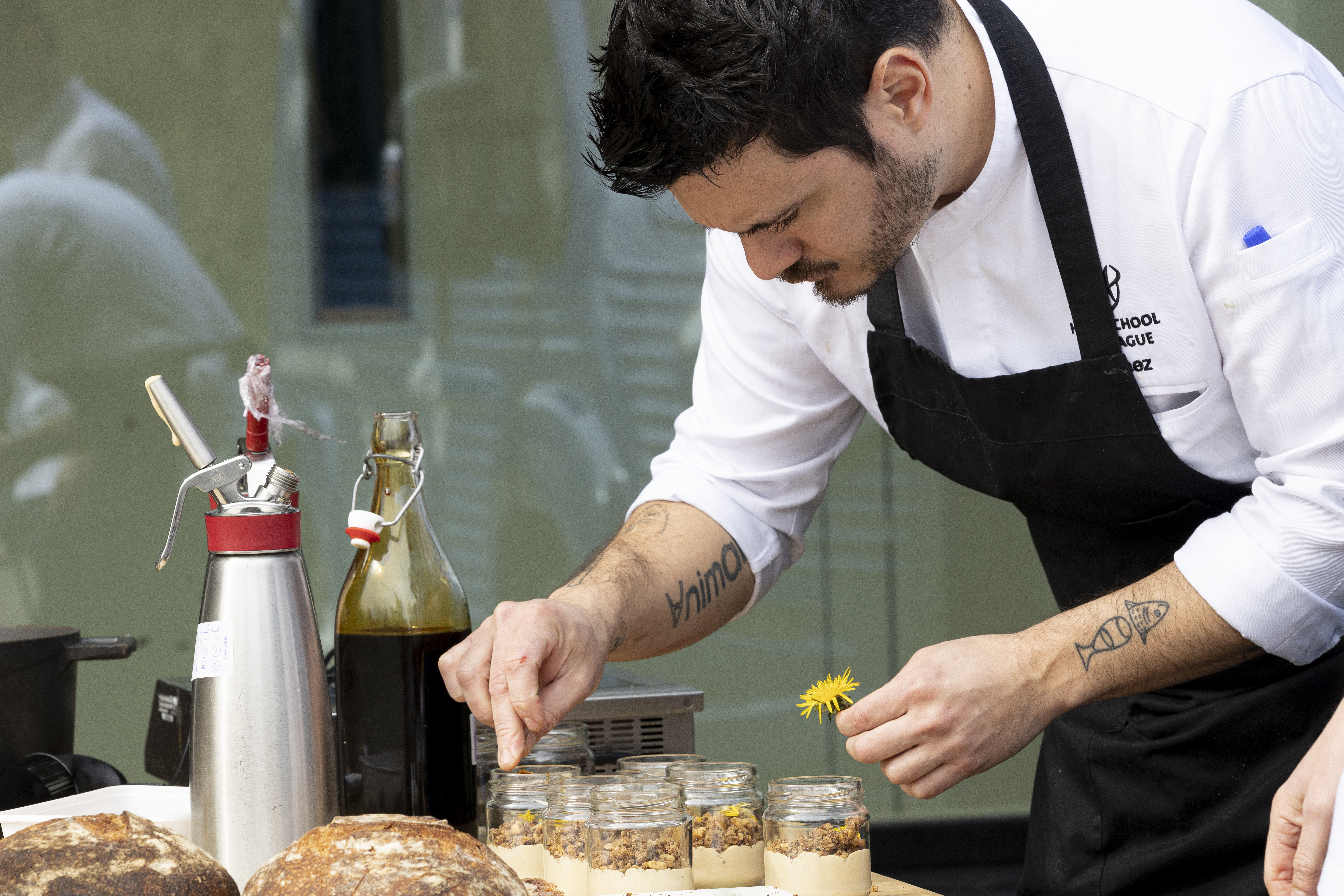At Hotelschool The Hague in The Netherlands, young people are trained to become hospitality professionals. Each year, around 520 students start their Bachelor’s degree in Hospitality Management. During their studies, they learn all about innovative producers, creative chefs, and inspiring entrepreneurs in food. But does an educational institution ensure that students also lead by example? From that question arose the food & beverage philosophy of Hotelschool The Hague, summarized in the food manifesto ‘SENSE’.
SENSE stands for Seasonal, Ethical, Nutritious, Supportive and Enjoyable. Joost de Vos, Executive Chef at Hotelschool The Hague: “The manifesto serves as a guideline for our staff, but also for our suppliers. It clearly shows—both internally and externally—what we, as a hotel school, stand for.”
Simone Williams, Lecturer in Marketing & Innovation and member of the SDG Office Team, was involved in drafting the manifesto. “With SENSE, we aim to promote the use of seasonal products, advocate for transparent and ethical food sourcing, focus on health, and offer our guests nutritious choices.”
The manifesto: SENSE
S: SEASONAL
Seasonal, locally sourced, from ‘local heroes’ or grown in the school garden.
De Vos: “Cooking seasonally means eating what’s produced nearby and naturally available at that time of year. This way, we reduce our ecological footprint, support local farmers and producers, and minimize CO₂ emissions from transport. Moreover, our guests enjoy a unique culinary experience rooted in local traditions. As our guests are highly international, this local focus adds an extra layer of authenticity to their dining experience at our restaurants.”

Local heroes
“At our F&B venues, we promote ‘Local Heroes’—suppliers located within a 20-kilometer radius of our campuses in Amsterdam or The Hague. Their products are featured not only on our menus but also at events with our food truck STREATS. Students prepare dishes with these ingredients in special locations, such as orchards, dairy farms, cattle farms, and greenhouses.”
School garden EDEN
To make students more aware of seasonal produce, both campuses feature a garden — called EDEN —where education and experience come together. Here, students learn about the journey from farm to fork, biodiversity, and healthy eating. The gardens grow seasonal vegetables, fruits, and herbs and include greenhouses, composting systems, and beehives.
.jpg)
E: ETHICAL
Food that is good for people, animals and the planet.
Williams: “Ethical food & beverage choices mean taking care of people, animals, and the planet. Our decisions aim to minimize harm and create positive impact. This translates into fair labor conditions, a shift toward more plant-based menus, and reducing food waste.”
Examples include:
-
Choosing suppliers who minimize food waste and reduce packaging.
-
Promoting plant-based eating as an ethical and sustainable choice.
-
Beehives on both campuses are harvested only once a year, to avoid disturbing the bees.
-
In the school gardens, students learn about the fragile relationship between humans and bees.
N: NUTRITIOUS
Food that doesn’t only just fill you up, but nourishes as well.
De Vos: “Nutrition plays a key role in well-being. On our campuses, we prioritize unprocessed ingredients, whole grains, fresh fruit, vegetables, legumes, and nuts. We avoid added sugars.”
The Food Boost Challenge
Starting in 2025, ‘healthy eating’ has been added to the first-year curriculum. Lecturer Mark Holst developed The Food Boost Challenge, an initiative that encourages young people to make healthy and plant-based food more appealing. It’s based on challenge-based learning. The program has five phases, guiding students from research to prototype. The winning team receives €2,500 to further development of their idea. Partners include Aldi, HAK, Vitam, Rabobank, and World Horti Center.
.jpg)
S: SUPPORTIVE
Social food choices and community involvement.
Williams: “We want to contribute to our community. Our food choices are socially engaged and rooted in collaboration. In 2025, we found a partner that shares this vision: wholesale company Bidfood. They supply local, seasonal products and support products developed by our (former) students.”
Another example is De Koekfabriek, where cookies are baked by people distanced from the labor market. The hotel school serves their cookies during coffee meetings.
E: ENJOYABLE
Food is experience, connection and joy.
De Vos: “Food is more than fuel. It’s about experience, connection, and joy—for the producer, the chef, and the guest. At Hotelschool The Hague, we believe that pleasure and sustainability go hand in hand. Take chocolate, for example: we organize tastings and discussions with chocolate makers about sustainable cultivation, fair trade, and surprising flavor combinations. In this way, we teach our students that you can enjoy and do good—at the same time.”
.jpg)